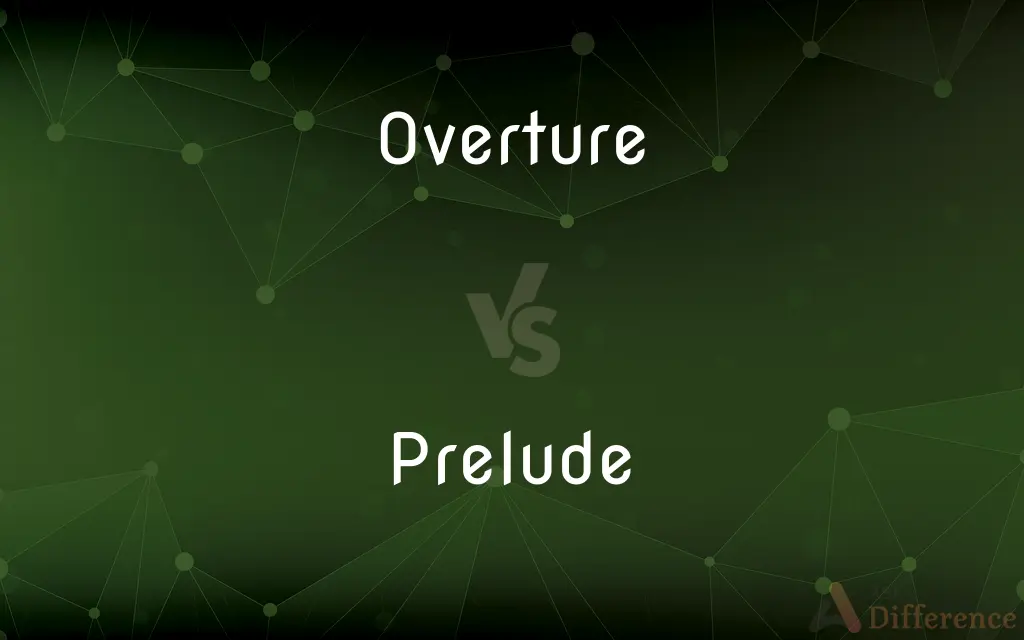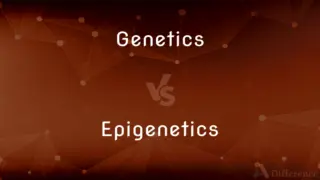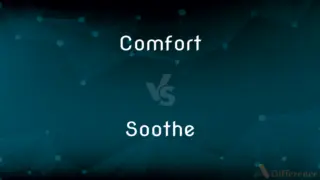Overture vs. Prelude — What's the Difference?
By Fiza Rafique & Maham Liaqat — Updated on May 2, 2024
An overture is an orchestral introduction to a musical piece, often an opera, whereas a prelude serves as a shorter, standalone piece or introduction to another section of music.

Difference Between Overture and Prelude
Table of Contents
ADVERTISEMENT
Key Differences
An overture is a comprehensive musical composition that traditionally opens an opera, ballet, or orchestral concert, presenting the main musical themes. On the other hand, a prelude is typically a shorter, introductory piece of music that may stand alone or introduce a longer piece, such as a fugue or an entire suite.
Overtures are usually orchestral and structured with multiple themes, often reflecting the drama and emotion of the subsequent performance. Conversely, preludes can be less formally structured and are frequently written for solo instruments, like the piano or organ.
Historically, the overture has played a key role in setting the thematic and emotional tone of operas and ballets, suggesting upcoming motifs and conflicts. In contrast, preludes often serve to establish the mood or key of the following sections without necessarily hinting at specific themes.
In terms of performance, overtures require a full orchestra and a conductor, making them a grand and communal presentation. On the other hand, preludes, especially those composed for solo instruments, provide a more intimate and focused listening experience.
The composition of an overture involves a detailed reflection of the piece it precedes, often capturing complex narratives in a condensed form. Whereas, preludes, though they can be complex, generally focus on musicality and technique rather than narrative exposition.
ADVERTISEMENT
Comparison Chart
Definition
An orchestral introduction to a larger musical work, especially in operas.
A short piece of music, serving as an introduction to another piece or as a standalone composition.
Typical Length
Longer, often 10 minutes or more.
Shorter, often under 5 minutes.
Composition
Structured, with multiple themes.
Can be less structured, focusing on mood or technical display.
Performance
Requires a full orchestra.
Often composed for solo instruments like piano.
Historical Context
Integral in operas and ballets for setting thematic tones.
Used to establish musical mood or technical preface in suites and larger compositions.
Compare with Definitions
Overture
A composition that encapsulates the themes of a musical or dramatic work.
The overture introduced the musical motifs that would appear throughout the show.
Prelude
A piece of music serving as an introduction to a longer piece or a concert.
The pianist opened with a Chopin prelude.
Overture
Used in classical concerts to preview complex orchestral arrangements.
The concert began with a powerful overture.
Prelude
Composes part of a larger suite or series, especially in Baroque music.
The prelude was the first part of Bach’s 'Well-Tempered Clavier.'
Overture
Occasionally, overtures serve as independent orchestral works.
Beethoven’s 'Leonore Overture No. 3' is often performed on its own.
Prelude
Sets the tone or atmosphere before a significant musical sequence.
The prelude subtly shifted from minor to major key, setting a hopeful tone.
Overture
An introductory music piece played by an orchestra at the start of an opera or ballet.
The overture set the dramatic tone for the opera.
Prelude
Often played solo, highlighting the performer’s skill.
She performed a prelude that showcased her technical prowess on the piano.
Overture
A dramatic opening that captures the audience’s attention.
The overture was a spectacular display of the orchestra's skill.
Prelude
Used in modern contexts to introduce themes or concepts in performances.
The band started with a prelude that hinted at the themes of their new album.
Overture
Overture (from French ouverture, lit. "opening") in music was originally the instrumental introduction to a ballet, opera, or oratorio in the 17th century.
Prelude
An action or event serving as an introduction to something more important
A ceasefire had been agreed as a prelude to full peace negotiations
Overture
An orchestral piece at the beginning of an opera, play, etc.
The overture to Mozart's ‘Don Giovanni’
Overture and Incidental Music for ‘A Midsummer Night's Dream’
Prelude
An introductory piece of music, most commonly an orchestral opening to an act of an opera, the first movement of a suite, or a piece preceding a fugue.
Overture
An introduction to something more substantial
The talks were no more than an overture to a long debate
Prelude
Serve as a prelude or introduction to
The bombardment preluded an all-out final attack
Overture
An approach or proposal made to someone with the aim of opening negotiations or establishing a relationship
He began making overtures to British merchant banks
Prelude
An introductory performance, event, or action preceding a more important one; a preliminary or preface.
Overture
An instrumental composition intended especially as an introduction to an extended work, such as an opera or oratorio.
Prelude
A piece or movement that serves as an introduction to another section or composition and establishes the key, such as one that precedes a fugue, opens a suite, or precedes a church service.
Overture
A similar orchestral work intended for independent concert performance.
Prelude
A similar but independent composition for the piano.
Overture
An introductory section or part, as of a poem; a prelude.
Prelude
The overture to an oratorio, opera, or act of an opera.
Overture
An act, offer, or proposal that indicates readiness to undertake a course of action or open a relationship.
Prelude
A short composition of the 1400s and early 1500s written in a free style, usually for keyboard.
Overture
To present as an introduction or proposal.
Prelude
To serve as a prelude to.
Overture
To present or make an offer or proposal to.
Prelude
To introduce with or as if with a prelude.
Overture
(obsolete) An opening; a recess or chamber.
Prelude
To serve as a prelude or introduction.
Overture
(obsolete) Disclosure; discovery; revelation.
Prelude
An introductory or preliminary performance or event.
Overture
(often in plural) An approach or proposal made to initiate communication, establish a relationship etc.
Overture of friendship
Prelude
(music) A short, free-form piece of music, originally one serving as an introduction to a longer and more complex piece; later, starting with the Romantic period, generally a stand-alone piece.
Overture
(Scotland) A motion placed before a legislative body, such as the General Assembly of the Church of Scotland.
Prelude
(programming) A standard module or library of subroutines and functions to be imported, generally by default, into a program.
Overture
(music) A musical introduction to a piece of music, or a play.
Prelude
(figurative) A forerunner to anything.
Overture
(intransitive) To make overtures; to approach with a proposal.
Prelude
To introduce something, as a prelude.
Overture
An opening or aperture; a recess; a chamber.
Prelude
To play an introduction or prelude; to give a prefatory performance.
Overture
Disclosure; discovery; revelation.
It was heThat made the overture of thy treasons to us.
Prelude
An introductory performance, preceding and preparing for the principal matter; a preliminary part, movement, strain, etc.; especially (Mus.), a strain introducing the theme or chief subject; a movement introductory to a fugue, yet independent; - with recent composers often synonymous with overture.
The last Georgic was a good prelude to the Ænis
The cause is more than the prelude, the effect is more than the sequel, of the fact.
Overture
A proposal; an offer; a proposition formally submitted for consideration, acceptance, or rejection.
Prelude
To play an introduction or prelude; to give a prefatory performance; to serve as prelude.
The musicians preluded on their instruments.
We are preluding too largely, and must come at once to the point.
Overture
A composition, for a full orchestra, designed as an introduction to an oratorio, opera, or ballet, or as an independent piece; - called in the latter case a concert overture.
Prelude
To introduce with a previous performance; to play or perform a prelude to; as, to prelude a concert with a lively air.
Overture
To make an overture to; as, to overture a religious body on some subject.
Prelude
To serve as prelude to; to precede as introductory.
[Music] preluding some great tragedy.
Overture
Orchestral music played at the beginning of an opera or oratorio
Prelude
Something that serves as a preceding event or introduces what follows;
Training is a necessary preliminary to employment
Drinks were the overture to dinner
Overture
Something that serves as a preceding event or introduces what follows;
Training is a necessary preliminary to employment
Drinks were the overture to dinner
Prelude
Music that precedes a fugue or introduces an act in an opera
Overture
A tentative suggestion designed to elicit the reactions of others;
She rejected his advances
Prelude
Serve as a prelude or opening to
Prelude
Play as a prelude
Common Curiosities
Do preludes have a standard structure?
Preludes do not adhere to a standard structure and can vary greatly in form and style, often depending on the composer and the era in which they were written.
How do preludes enhance a musical performance?
Preludes enhance musical performances by setting the emotional or thematic tone, providing a context or contrast to the main pieces that follow.
What role do overtures play in modern orchestras?
In modern orchestras, overtures continue to serve as powerful opening pieces that can showcase the ensemble's range and set the stage for the musical journey of the concert.
How are preludes used in contemporary music?
In contemporary music, preludes are often used to introduce themes or create a specific atmosphere, similar to their traditional role but possibly incorporating modern elements and instruments.
Is there a difference in instrumentation between overtures and preludes?
Yes, overtures typically utilize full orchestral instrumentation, whereas preludes may be written for solo instruments or smaller ensembles, focusing more on individual expression or specific musical textures.
Who are some famous composers known for their preludes?
Famous composers known for their preludes include Frédéric Chopin, Johann Sebastian Bach, and Claude Debussy, each bringing distinct styles and innovations to the form.
Are overtures always part of larger works?
Yes, overtures are traditionally part of larger musical works like operas or ballets, where they introduce thematic elements of the upcoming performance.
What is the historical origin of overtures?
Overtures originated in the 17th century as introductory musical performances in operas and have since evolved into significant orchestral works within various musical genres.
Can preludes and overtures be improvised?
While preludes, especially in jazz and modern music, can be improvised, overtures are usually composed and notated due to their complexity and role in larger works.
How does one approach composing a prelude?
Composing a prelude often involves focusing on a particular musical idea or technique, such as a motif, a tonal exploration, or a rhythmic pattern, to effectively set the stage for subsequent pieces.
Can an overture stand alone as a concert piece?
While overtures are designed to introduce larger works, many, like Rossini's overtures, are frequently performed as standalone pieces in concerts due to their complete and engaging musical structure.
Do overtures have a narrative purpose in operas?
Yes, in operas, overtures can serve a narrative purpose by foreshadowing the plot, introducing key musical motifs, and setting the emotional landscape of the story.
Are there notable differences in overtures across different musical periods?
Yes, overtures have evolved across different musical periods, from the baroque sinfonias to the dramatic and thematic overtures of the Romantic era, reflecting changes in musical style and audience expectations.
What impact do preludes have on the listener’s experience in a recital?
Preludes can significantly impact the listener's experience by preparing their emotional and auditory palette for what is to come, making them an essential part of recitals.
Can overtures incorporate themes from multiple sources?
Yes, overtures, particularly those in operas or musical theatre, can incorporate and develop themes from multiple sources within the same work to provide a cohesive musical summary to the audience.
Share Your Discovery

Previous Comparison
Genetics vs. Epigenetics
Next Comparison
Comfort vs. SootheAuthor Spotlight
Written by
Fiza RafiqueFiza Rafique is a skilled content writer at AskDifference.com, where she meticulously refines and enhances written pieces. Drawing from her vast editorial expertise, Fiza ensures clarity, accuracy, and precision in every article. Passionate about language, she continually seeks to elevate the quality of content for readers worldwide.
Co-written by
Maham Liaqat















































